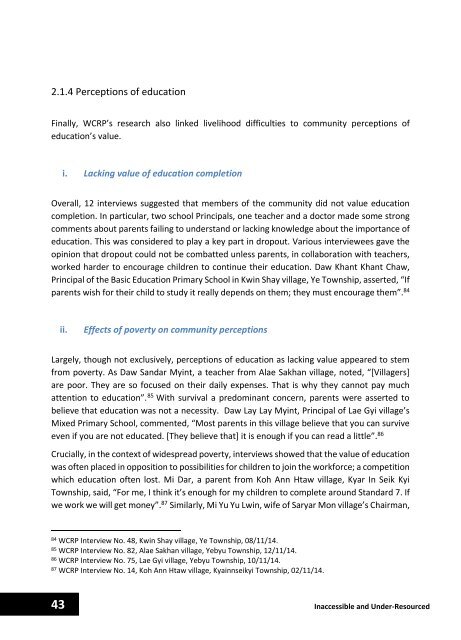Final-Edition
Final-Edition
Final-Edition
Create successful ePaper yourself
Turn your PDF publications into a flip-book with our unique Google optimized e-Paper software.
2.1.4 Perceptions of education<br />
<strong>Final</strong>ly, WCRP’s research also linked livelihood difficulties to community perceptions of<br />
education’s value.<br />
i. Lacking value of education completion<br />
Overall, 12 interviews suggested that members of the community did not value education<br />
completion. In particular, two school Principals, one teacher and a doctor made some strong<br />
comments about parents failing to understand or lacking knowledge about the importance of<br />
education. This was considered to play a key part in dropout. Various interviewees gave the<br />
opinion that dropout could not be combatted unless parents, in collaboration with teachers,<br />
worked harder to encourage children to continue their education. Daw Khant Khant Chaw,<br />
Principal of the Basic Education Primary School in Kwin Shay village, Ye Township, asserted, “If<br />
parents wish for their child to study it really depends on them; they must encourage them”. 84<br />
ii.<br />
Effects of poverty on community perceptions<br />
Largely, though not exclusively, perceptions of education as lacking value appeared to stem<br />
from poverty. As Daw Sandar Myint, a teacher from Alae Sakhan village, noted, “[Villagers]<br />
are poor. They are so focused on their daily expenses. That is why they cannot pay much<br />
attention to education”. 85 With survival a predominant concern, parents were asserted to<br />
believe that education was not a necessity. Daw Lay Lay Myint, Principal of Lae Gyi village’s<br />
Mixed Primary School, commented, “Most parents in this village believe that you can survive<br />
even if you are not educated. [They believe that] it is enough if you can read a little”. 86<br />
Crucially, in the context of widespread poverty, interviews showed that the value of education<br />
was often placed in opposition to possibilities for children to join the workforce; a competition<br />
which education often lost. Mi Dar, a parent from Koh Ann Htaw village, Kyar In Seik Kyi<br />
Township, said, “For me, I think it’s enough for my children to complete around Standard 7. If<br />
we work we will get money”. 87 Similarly, Mi Yu Yu Lwin, wife of Saryar Mon village’s Chairman,<br />
84<br />
WCRP Interview No. 48, Kwin Shay village, Ye Township, 08/11/14.<br />
85<br />
WCRP Interview No. 82, Alae Sakhan village, Yebyu Township, 12/11/14.<br />
86<br />
WCRP Interview No. 75, Lae Gyi village, Yebyu Township, 10/11/14.<br />
87<br />
WCRP Interview No. 14, Koh Ann Htaw village, Kyainnseikyi Township, 02/11/14.<br />
43 Inaccessible and Under-Resourced


